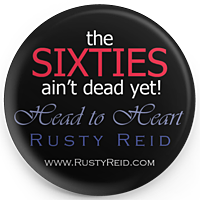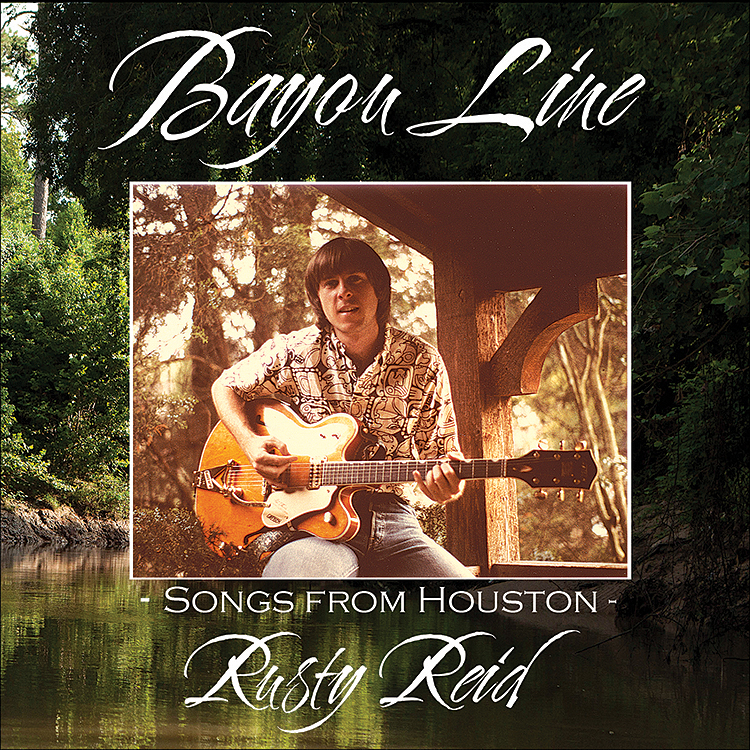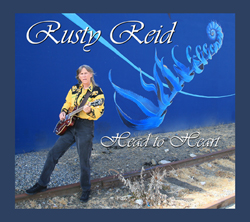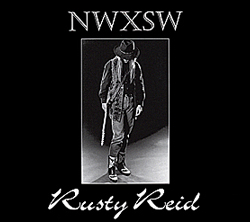
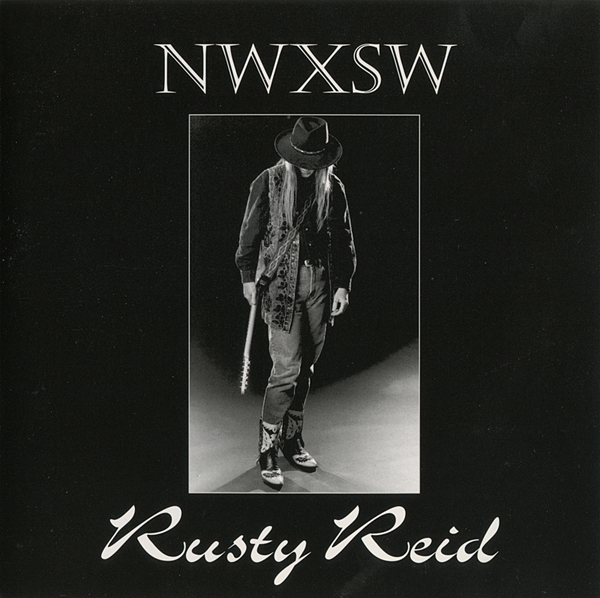 2001: NWXSW Northern Latitudes Records Copyright © Rio Paso Music (BMI) About | Lyrics/Notes | Reviews | Order | Stream
WITH TIME RUNNING OUT, A SORT-OF BEST-OF, FIRST - & LAST? - ALBUM Drifting in Los Angeles, bored and coasting in a dazzling position as a bigtime sports writer and editor, but distracted and disturbed by personal upheaval, a crisis of confidence about his music, and, um, other things, Rusty quit the average Joe's dream job, said goodbye to the City of Dreams and moved to the Puget Sound area in the summer of 1995. The plan was to tap into the realer, rawer energy of Seattle and allow the stunning awesomeness of the Pacific Northwest's nature to heal and nourish his psyche. But in Seattle, reality forced a scramble just to make a living. It would take four years before Rusty could put together his first CD, to be titled, NWXSW. The album title is a play on SXSW (South by Southwest, the annual music conference in Austin). Rusty's personal journey has been from Southwest to Northwest. Why did it take so long to put out an album? Rusty explains, "I didn't feel like I had strong enough material, audio quality wise, to release an album previously. But in 2000 I got a group of Tacoma guys together and recorded four songs, which I thought came out well, and provided a spark. Those four combined with four of the best sounding of some songs I had done in Houston, three other songs that Steve Beasley helped immensely with, and then a couple from my L.A. home studio added up to an album I could be more or less happy with. I couldn't afford to be too picky. I felt like time was running out. It was now or never. So I was set with that lineup of 13 songs when a final song came out of nowhere. That was 'We are the Barbarians'. I hastily recorded that myself in my home studio in Washington, and it became the last song on the album. I was 48 at the time, and so I figured this might well be my one and only album." NOT EXACTLY THE RIGHT MESSENGER OR MESSAGE FOR A COUNTRY CONSUMED BY MINDLESS PATRIOTISM This album was released in June of 2001. Sales of the CD were dismal. A few songs off the album were played on European radio, but that was the extent of NWXSW's wider exposure. Then came 9/11. Following the terrorist attacks, Rusty felt drained and depressed. "This was added on top of the sour and dour feeling I already had from the 2000 presidential election and inauguration of George W. Bush. I just knew that guy would be a disaster for the country, and the world. Sure enough, he was asleep at the wheel while the terrorists plotted and then acted. Somehow he came out looking like a hero, with a 90 percent approval rating across the country. What a crock!" As the neocons schemed how they could parlay the tragedy into achievement of their long-held political goals (including taking over the oil fields of Iraq) and an angry and misguided wave of patriotism swept the country, one thing was certain: nobody was interested in listening to an artist proclaiming We are the barbarians! So NWXSW sank into oblivion in the ever more cacaphonous world of popular music. Yet, all these years on, NWXSW stands as remarkable "hodgepodge." The tunesmithing remains choice, the guitars still twanging, the pop songs are still sassy and fun, the New Wave influenced Houston songs remain lovably quirky, the wistful middle songs still deep and compelling, "Earthquake City" still ominously warning of the Big One (for Los Angeles, San Francisco, Seattle and Earthquake Cities all around the Ring of Fire), "Known You Twice" still stands as one of Rusty's best love songs, "Right Before Your Eyes" reminding that most of us have everything we need to be happy, and the penetrating "Where Do We Go From Now" a blueprint for higher human evolution. As for "Barbarians", it seems America has not gotten much better. Although the song refers not specifically to America but to the worst of human culture in oppressing and assaulting each other and nature, "Barbarians" now has even more potency than originally with the rise of Trump, nationalism, xenophobia, gross materialism, insane disparity of wealth, and continuing ignorance and nonchalant indifference, if not outright hostility, for Mother Earth. In retrospect, of course, NWXSW turned out not to be Rusty's first and last album. It wasn't the end, but the heralding start of Rusty as a different kind of artist. With songs such as "Earthquake City," "Key to the City," "Right Before Your Eyes," "Where Do We Go From Now" and "Barbarians," the pop and country-rock songwriter from Texas had morphed into a singing, strumming social justice warrior and eco-evo-revo-spiritual rebel. It would take a while to get back on his feet, but more and even harder hitting, higher reaching songs were to come.
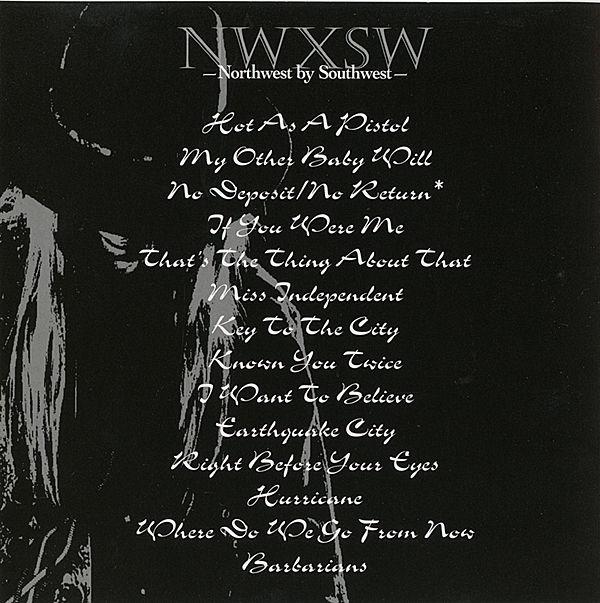
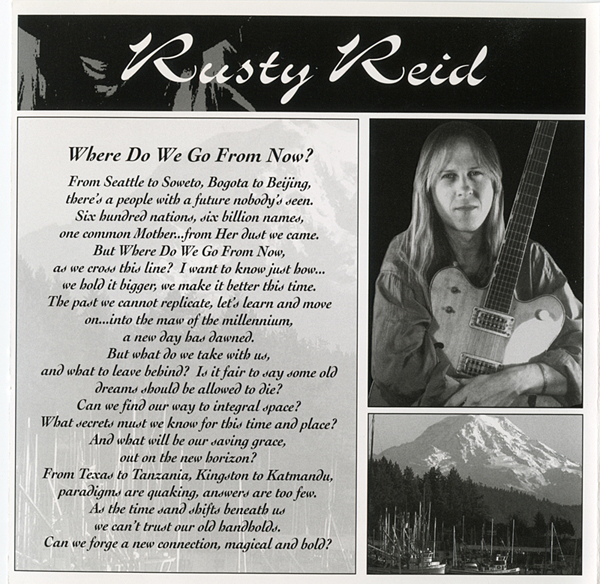
Basically, NWXSW is something of a "best-of" sampler of my decently recorded material. It's a hodgepodge. I do think this batch is some of my best songs, yet I knew the album didn't really hang together as a singular work stylistically or thematically. The alternative was to create some sense of evolution of the music across the album. So I decided to go for a mood/feel that traversed from light/fun to dark/deep. The tracks are arranged in a quasi chronological order, with the lead songs on the album, mostly earlier songs, bouncy and fun, while the mood/theme trends edgier and more philosophical as the album continues with more recent tunes. The notable exception to the chronology is "Hurricane" a song written and originally recorded in Houston but re-recorded with the Tacoma crew. The last two songs on the album, "Where Do We Go From Now" and "Barbarians," both feature sharp social commentary, were the latest written, and would become a harbinger of the Head to Heart album in tenor and tone.
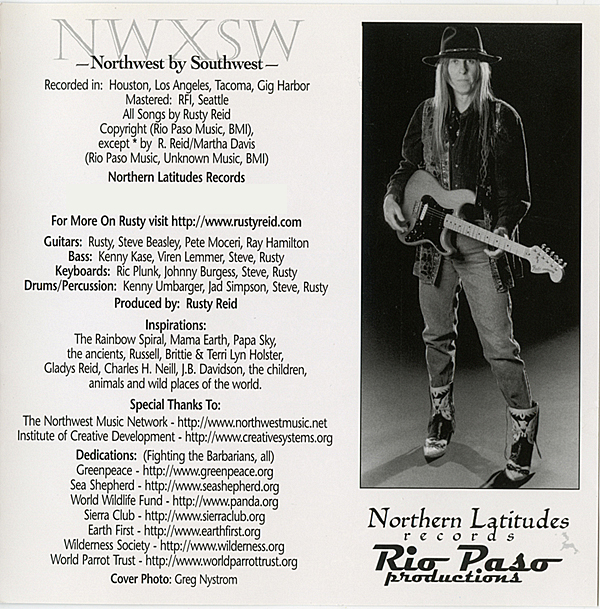
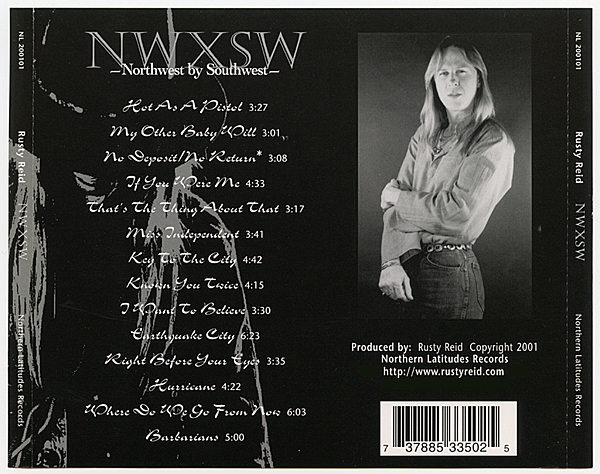
REVIEWS:
I am thoroughly enjoying your CD, NWXSW. It's hard to single out a song or two or three. I love "Hot as a Pistol." You have so, so much talent. Some of the music remind me a little of Tom Petty, but you have your own sound. It's unique and just so darned good. I could hear different groups and how they would sound if they recorded some of these songs. I love the country edge on some of them. Others make me think of groups like The Moody Blues. Your songs are very distinctive and all over the map but still have a common thread. Very, very good. Not a bad one in the bunch.
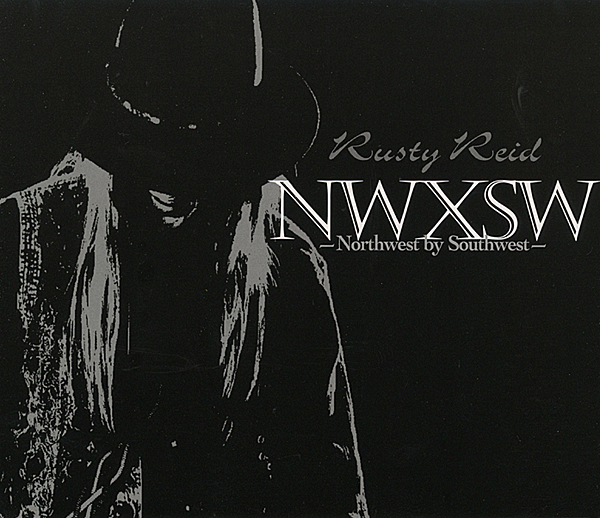
BUY "NWXSW" - signed by Rusty
$11.99 (free shipping)
And get a free bonus "The Sixties Ain't Dead Yet" button - while they last!
- OR -
BUY THE DOWNLOAD on
1. Hot as a Pistol
Baby I know what you're here for
Rusty - guitar, vocals
Backstory: "Hot as a Pistol" was written in Houston in May of 1976, and first recorded a few years later at a small 8-track recording studio in the Bayou City. I wanted a rocking, kind of sexy song, with a signature guitar riff like "Day Tripper," and this is what I came up with. The song became a staple of live shows with The Unreasonables, and was featured as one of the cuts on the first of a series of "homemade" albums by local FM radio station KRLY (Y-94) in 1979. Steve Beasley played lead guitar on the original recording, and I went back to Steve for this updated version, asking that he play the lead break note for note as before. NOTE: The original version of this song is included on the album "The Unreasonables" by Rusty Reid.
2. My Other Baby Will
I know you're thinking that your leaving's gonna make me sad
Rusty - guitar, vocals Backstory: 1981 was a banner year of songwriting in Houston. Five of the songs on NWXSW were written that year, including "My Other Baby Will." This song was played live by the Unreasonables, but never previously recorded. It's just a fun little song, I've always liked it, having a a bit of that New Wave vibe to it while also being kind of 60s-jangly thing happening, as well. This version was recorded in 2000 at Pacific Studio in Tacoma, WA.
3. No Deposit, No Return
Rusty - guitar, vocals
4. If You Were Me
If you knew you like I do
Rusty - guitar, vocals Backstory: By 1983, my band had run its course, and I had decided to move back to Los Angeles. I got the Unreasonables together one last time to go into Houston's Musicians Recording Studio (M.R.S.) on Richmond Avenue to record 10 songs. Four of those appear here, including "If You Were Me." Another 1981 song, it became a fixture on the Unreasonables set list. Rick Plunk, my bandmate in an earlier Houston group called Southern Cross, was brought into the studio to augment the sound on keyboards. A good keyboard player was the big missing ingredient to the live sound of the Unreasonables. "Rick's contribution here really shows the potential we never achieved on stage.
5. That's The Thing About That
I'd like to get to know you better
Rusty - guitar, vocals Backstory: "That's the Thing About That" is another 1981 song and Unreasonables standard. I think I was going for sort of a Cars quality with this song. I was very influenced by that group during this era. But also Elvis Costello, so maybe this is kind of a mash-up of the two influences.
6. Miss Independent
I know your mind is wandering Backstory: This was written for a special lady in my life at the time, who could be very moody and withdrawn at times. Another '81 Unreasonables number, "Miss Independent" was set to be the first "single" from NWXSW, if it ever took off. It never did, not even close.
Rusty - guitar, vocals
7. Key to the City
Blue and gold mosaic dome
Rusty - guitar, vocals Backstory: "Key to the City" was one of two songs that emerged out of the Loma Prieta earthquake of 1989 that severely damaged San Francisco. See the backstory for "Earthquake City" below that details my experience during and after the quake. In the days after the quake, I remained in San Francisco, one day finding myself at a picture postcard "park of palms... don't know it's name" (actually Alamo Square Park). I was sitting on the grass in the October sun, watching the people come and go, looking across the park at these exquisite old Victorians, the city down below and golden hills visible across the bay. It was mesmerizing. What a city! Then I began to think about the earthquake and fires, and that took me to recall the various fires in San Francisco's history, especially the big 1906 fire. Did this park even exist back them? If so, what happened here during that great conflagration and afterwards? Who were those people? Who are these people? It all stirred thoughts of what strange creatures cities actually are. Growing up in a medium-sized town, I dreamed of big cities. I do love them. But I had never considered their deeper soul. They are like living entities, at some point coming together, being born, growing, morphing through toddlerhood to soaring cityscape, enduring all kinds of events, good and bad, healthful and harmful, some of them prospering, some withering, most eventually transformed into some kind of organism that earlier residents, even pillars of the community, those with the "keys to the city," would not recognize. So I thought the ever changing face of a city would be a good theme for a song. You can live in a city, as I have in Austin and Houston and Nashville and L.A. and Seattle, and think you know it well, understand its heartbeat. But leave one of these major metropolises and come back in 20 years and your former home has become somehow aloof, strangely foreign. Come back in 50 years, and there will be vast swaths you don't recognize, and once cherished neighborhoods vanished. Come back in 100 and there will likely be no trace of your old footsteps. The key to the city can be held only ephemerally.
8. Known You Twice
Doesn't it seem we've known each other longer than this?
Rusty - guitar, keyboards, vocals Backstory: "Could it Be I've Known You Twice" was written in 1978, for a brand new girlfriend. After a long relationship that didn't work out, I quickly found myself in a new romance. That first phase of dating is filled with all kinds of feelings, but one that struck me this time was how comfortable I felt with her right off the bat. It was like we were long-lost lovers. The thought of past lives crossed my mind. I'm not a believer in reincarnation or the cycle of rebirth; it would break the laws of nature, and I am a big fan of those. But it seemed like a romantic, and somewhat spooky, device for a romantic love song. I do think it's one of my best songs. One of my college buddies thought so, too, asking me to play it at his wedding.
9. I Want to Believe
I can see your point now, I can see what you went through
Rusty - guitar, vocals Backstory: Written in 1981 a week before "My Other Baby Will, this song comes from an entirely different angle. While "My Other Baby" is jauntily, humorously, defiant, "I Want to Believe" is an extended apology. To whom, for what? "It's only very vaguely autobiographical. It did emerge right in the middle of a breakup that I did not want, but it's far more of a dramatic flight of fancy than the reality. The arrangement and instrumentation strive to match that drama.
10. Earthquake City
We are living by the sea Rusty - vocals, acoustic guitar, electric guitar, keyboards, bass, drum programming Backstory: On October 17, 1989, at right about five o'clock in the evening, I as sitting in San Francisco's Candlestick Park awaiting the imminent start of the third game of the World Series between the Oakland A's and San Francisco Giants. I was in the upper rows behind the first base line, directly under these huge concrete baffles, when the entire stadium started violently shaking. I had been in the Whittier earthquake down in L.A. a few years earlier, which scared the hell out of me, but immediately knew this was much stronger. The shaking went on for what seemed like five minutes, and then it stopped. Everybody in the stadium was stunned. The power had gone off in the stadium but it was still daylight. We all stood there looking around... no one seemed hurt... the stadium was still standing. It was dubbed "The Bay Area Series," so pretty much the entire crowd had earthquake experience. A guy climbed one of the light poles, and shortly thereafter the stadium lights came back on. Soon the crowd started chanting "Let's Play Ball!" We didn't know what had happened around the city. People had been killed, sections of the Bay Bridge had collapsed, parts of the city were on fire, homes lay in rubble. The game was quickly cancelled, and the World Series would be postponed for 10 days. Through that period, I lingered in San Francisco, taking in the historicity of the event. Once back in L.A., another "Earthquake City," I thought about how these terror filled, deadly events, don't seem to oermanently phase the populace overall. Nobody ever leaves the area because of the prospect of earthquakes. Surely some of those people, and/or their children or grandchildren, will pay with their lives for that reasoning. Living in the Seattle area, I'm still on the "Ring of Fire," which extends around the Pacific Ocean. There are a lot of "Earthquake Cities," comprised of hundreds of millions of risk-taking idiots. I'm one of them. Yet we won't desert our particular city, even in the face of one of nature's cruelest killers.
11. Right Before Your Eyes
I see you crying again Rusty - vocals, acoustic guitar, electric guitar, keyboards, bass, drum programming Backstory: This song is special to me because it was written in 1988 for my mother. She had an idyllic early childhood in Austin, Texas. Then it all suddenly fell apart. First came the Depression, then her father fell victim to tuberculosis. The family had to move from her beloved, beautiful, little (back then) Austin, with its trees and hills and streams, out to a desolate, rattlesnake-infested farm in West Texas. One of the few bright sides of this sudden relocation was the proximity of a favorite uncle. Then he was killed in a car crash. He father's health continued to deteriorate, and he died that same year, when she was 11. Only a few years later her mother was struck down by cancer, both parents gone by the time she was 19. And then World War II started. Even though smart and funny and full of life, melancholy and sadness lurked in the background the rest of her life. I felt this keenly because I think we were very much alike; we just had experienced life in diametrically opposite ways. This song was one attempt of many to reach her. I think it's both a pretty melody and poignant lyrics. Knowing it was about her, she didn't like it. Note the third line in the song. "Another way" would be expounded upon in my next album.
12. Hurricane
I fell in love with a Hurricane
Rusty - guitar, vocals Backstory: Like "Hot as a Pistol," "Hurricane" is a late 70s vintage song, reclaimed and remade for NWXSW. "Hurricane" was written in 1977 and recorded in 1978 at Magic Rat Studio with something of an all-star cast of Houston players, including Steve Beasley and Rick Poss on electric guitars, Roger Tausz on bass and Billy Block on drums, the same group (sans Rick) that had recorded the original version of "Hot as a Pistol" a few weeks earlier. The Unreasonables would later play it live. For NWXSW, I decided to resurrect "Hurricane," this time looking for a different sound. The original recording has this cool double lead by Steve and Rick. I always loved that, but this time I was looking for something a little more bluesy. Pete Moceri did a great job coming up with a very soulful, sexy lead break. This version is different, but it still has my original signature riff. NOTE: The original version of this song is included on the album "The Unreasonables" by Rusty Reid.
13. Where Do We Go From Now
From Seattle to Soweto, Bogota to Beijing
Rusty - guitar, vocals Backstory: In 1999 I attended a series of workshops in Seattle with psychiatrist, writer and futurist Charles Johnston, the creator of Creative Systems Theory and the Institute for Creative Development. Charlie's discussions regarding change, purpose, integral thinking and acting greatly impressed me. At the conclusion of the weeks-long workshop, the students were asked to complete some kind of project, a paper or artwork or something, which encapsulated some of the themes of Creative Systems Theory. I, of course, chose to write a song, "Where Do We Go From Now." The song asks the essential question Charlie poses: How do we best understand the times in which live and the challenges ahead for us as a species? Charlie and the group loved it. This response in the summer of 1999, from smart, talented people, was the initial spur that got the album underway. The chorus lyric originally went "Where do we go from now... Nineteen Ninety-Nine." As 1999 came and went, that phrasing was changed to "as we cross this line," meaning the line of the millennium. That line itself has now receded in the distance, but the question is still on the table. I would pursue it with greater fervor on his next album.
14. (We Are The) Barbarians
Since Cain and Abel it's been fight, fight, fight
Rusty - vocals, acoustic guitar, electric guitar, keyboards, bass, drum programming Backstory: Recording for NWXSW was all but wrapped up when, out of the blue, a new song burst forth, seemingly out of nowhere. I wasn't even thinking about writing anything at the time - I was busy trying to finish the mixes and put together the packaging for the album, when all of a sudden I'm sitting in the studio and out comes "We are the Barbarians!" This song came out of becoming increasingly pissed off at the state of the world. George W. Bush had just been elected on a skid of lies. Al Gore, America's last best hope to stop Global arming had been defeated. I was growing increasingly agitated about human destruction of the environment and wanton cruelty toward animals. I was sick of the white-washing of American history and that of Western Civilization as a whole, yet none too impressed with the legacy of the rest of this vaunted species called Homo sapiens, either. The rich were getting richer, the poor poorer, injustice still rampant, religious zealots some of the worst humans, conservatives the worst patriots, but the winners still claiming the right to control the narrative. This song was my way to fight back. Yes, we are the barbarians, and that's putting it mildly. It could well be said that we are a scourge, a cancer, a virus upon the face of the planet. There can be no mistake that the planet itself, certainly the entire rest of the biosphere, would be better off without us. Yet would the cosmos be better off without us? How difficult is it for the Universe to concoct a living being that can reflect on how horrible its species is from a rational, ethical, moral, spiritual perspective? What a shame if this chance at higher consciousness were lost. Are we the best the universe has to offer? Does higher consciousness inevitably result in the enslavement and slaughter of all other life? Or is there a much higher degree of consciousness than our selfish, vicious species has even imagined yet? We simply must do better. This rampaging around the world, now considering militarizing space, is absurd, insane, completely immoral, and very likely suicidal. If we don't face up to our barbarism, there probably isn't much hope that things will ever change... until, that is, we succeed in destroying it all.
All songs Copyright © Rio Paso Music (BMI)
NWXSW also included one cover tune, No Deposit, No Return, first recorded in 1952 by Martha Davis, and also in the same year by the Andrews Sisters. I discovered Martha Davis' version of the tune among a stash of 78 RPM records in an abandoned house near Houston, and it became a staple of my band at the time, The Unreasonables. The Houston band recorded it in 1980. This version was recorded with the Tacoma band in 2000 at Pacific Studio in Tacoma.
|
© Copyright Rio Paso Music Productions
